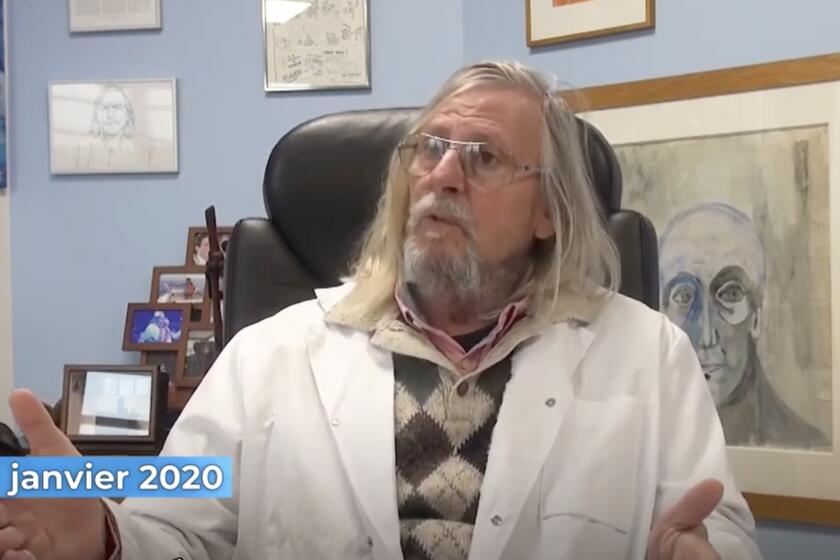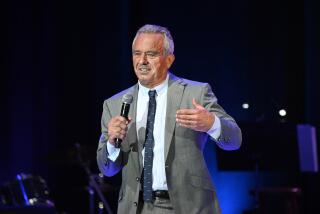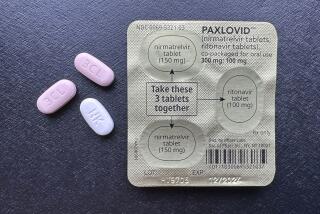Column: The craze for Trump’s chloroquine COVID-19 remedy is dying out

You may have noticed that mentions of antimalarial drugs as remedies for the novel coronavirus infection have fallen off a cliff lately. Two new data points released in recent days might well end the craze completely.
The two latest developments include a study of cases at Veterans Affairs Department hospitals showing that COVID-19 patients who received hydroxychloroquine died at higher rates than those who didn’t receive it.
Nor did the researchers find that treatment with the drug affected the rate at which the patients, who generally had advanced COVID-19 illness, needed to be put on ventilators, the most extreme therapy for the disease.
The fact of the matter is, we don’t know .... At this point ... we are better off waiting for the randomized trials Dr. Fauci has been asking for.
— Dr. Oz backs away from his chloroquine claims
The second development is an advisory from the National Institutes of Health recommending against the use of hydroxychloroquine in conjunction with the antibiotic azithromycin in COVID-19 cases. The advisory carries the code A-III, meaning that it’s a “strong recommendation” against, based on “expert opinion.” The NIH cites the drug combination’s “potential for toxicities.”
These developments, as it happens, are probably beneficial for patients, as they’ll discourage doctors from prescribing a treatment that has not been shown to be effective and carries documented risks of harm, including heart damage.
Here’s what a hospital chain went through to get a supply of coronavirus masks
Randomized controlled trials underway at several institutions — the gold standard for medical research — may yet show some benefits for the drugs, but expectations among healthcare professionals were falling fast even before now.
The latest developments are bad news for President Trump, whose aggressive promotion of the hydroxychloroquine/azithromycin combination, which he predicted might be “one of the biggest game changers in the history of medicine,” was one of the very few concrete actions he has taken in the crisis.
Trump has backed away from this claim in recent days. After regularly trumpeting the treatment at his daily White House coronavirus briefings, he ceased mentioning it around April 14, according to briefing transcripts.
At Tuesday’s briefing, Trump was forced by reporters’ questions to confront the new developments. “I don’t know of the report,” he said of the VA study. Of the NIH recommendation, which came from the National Institute of Allergy and Infectious Diseases headed by Dr. Anthony Fauci, he said: “Well, we’ll take a look at that .... I’m always willing to take a look.”
Television doctor Mehmet Oz, who has also been aggressively talking up the hydroxychloroquine/azithromycin treatment in appearances on Fox News, also became more circumspect on the air Wednesday.
“The fact of the matter is, we don’t know,” Oz told a panel of Fox News anchors. “At this point ... we are better off waiting for the randomized trials Dr. Fauci has been asking for.”
The study of VA patients by researchers at the VA and the University of Virginia was posted on medRxiv, a website that previews research that has not yet completed the peer-review process.
The study examined retrospectively 368 COVID-19 patient cases at VA hospitals from March 9 through April 11. Of those patients, 113 received the combination treatment, 97 received hydroxychloroquine alone and 158 received neither. The death rates were 27.8% in the first group, 22.1% in the second and 11.4% in the third.
The patients weren’t given the treatment for purposes of the study, which only began after all either had died or been discharged. All were males.
The researchers observed that hydroxychloroquine was administered at the VA to patients with more severe disease and therefore a higher chance of death. But they said they made statistical adjustments to accommodate the distinction as well as some other differences including underlying medical conditions among those receiving the drugs.
President Trump’s hype of a potential treatment for COVID-19 gives false hope to virus patients and causes real harm to others.
The researchers offered veiled criticisms of doctors rushing to prescribe the antimalarial treatments during the coronavirus pandemic. Their findings, they wrote, “highlight the importance of awaiting the results of ongoing prospective, randomized, controlled studies before widespread adoption of these drugs.”
They noted that enthusiasm for the treatment could be traced to a single, nonrandomized study in France. As we’ve reported, that study, which was the basis for the claims offered by Trump and Oz, has been widely criticized as sloppy and inconclusive. Indeed, the medical society that published the study has said it “does not meet the Society’s expected standard.”
The VA researchers also implicitly criticized the Food and Drug Administration for issuing a rare emergency use authorization for hydroxychloroquine “despite limited and conflicting data” on its use and based on “anecdotal and limited observational evidence.” The study’s lead author, Jayakrishna Ambati of the University of Virginia, declined to comment on the findings because the paper is still undergoing peer review.
The NIH, in its guidelines, stated that there are “insufficient clinical data to recommend either for or against using chloroquine or hydroxychloroquine for the treatment of COVID-19,” but it either drug is used, doctors should monitor patients for heart irregularities known to be associated with the drugs.
The combination of hydroxychloriquine and azithromycin drew a stronger warning that they should not be used except in the course of a clinical trial.
More to Read
Inside the business of entertainment
The Wide Shot brings you news, analysis and insights on everything from streaming wars to production — and what it all means for the future.
You may occasionally receive promotional content from the Los Angeles Times.












